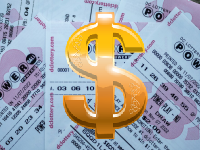John C. Cheeks Sues Powerball – The Battle for Unclaimed Millions

John C. Cheeks’ Hope Dashed
Everyone daydreams of winning the lottery and imagining all the things they would do as winners. In the world of lottery dreams, John C. Cheeks was no different from millions of hopeful players. He clutched his Powerball ticket, eyes wide with anticipation, as he checked the winning numbers. The digits on his ticket matched those displayed on the D.C. Lottery’s website. His heart raced; he believed he had won the $340 million jackpot. But fate had other plans.
On January 7, 2023, John C. Cheeks, a Washington, D.C., resident, saw his chosen numbers—7, 15, 23, 32, and 40—mirrored on the lottery website. The yellow Powerball number was a perfect match. Cheeks was elated. He envisioned paying off debts, securing his family’s future, and perhaps even fulfilling a lifelong dream.
Buy one Powerball ticket and get one for free 🎁
However, when Cheeks presented his ticket to the Office of Lottery and Gaming (OLG), his euphoria turned to disbelief. The OLG denied his claim, leaving him stunned. One of the claims agents coldly advised him to toss the ticket in the trash. But John C. Cheeks clung to hope. He sought legal counsel, determined to fight for what he believed was rightfully his.

John C. Cheeks Sues Powerball
John C. Cheeks’ Legal Battle: Fighting Powerball
The courtroom drama unfolded around a seemingly innocuous technical glitch. According to court documents, on January 6, 2023, a quality assurance team at the D.C.-based Taoti Enterprises was testing the lottery website. On that fateful day, a set of test Powerball numbers—coincidentally matching Cheeks’—was accidentally posted online. Those numbers remained visible for three days until January 9. Unfortunately for Cheeks, they didn’t align with the winning numbers drawn during the last lottery event.
John C. Cheeks filed a lawsuit against Powerball and the DC Lottery on eight counts, including breach of contract, negligence, infliction of emotional distress, and fraud. His lawyer, Richard Evans, argued that because the numbers posted on the website matched Cheeks’ ticket, he was entitled to the entire jackpot.
If not, John C. Cheeks deserved damages for the gross negligence of the lottery in posting erroneous numbers. Evans emphasized that this case wasn’t merely about numbers on a website. It was a battle for the integrity and accountability of institutions that promise life-changing opportunities. Powerball and the DC Lottery profited from players’ dreams, yet their safeguards failed. Cheeks’ lawsuit questioned the reliability of lottery operations and the consequences of their errors.
The irony wasn’t lost on anyone. The odds of winning the Powerball jackpot were one in 292.2 million—a cosmic rarity. In contrast, the chances of being struck by lightning within a year stood at one in 1.22 million. John C. Cheeks, like all players, had defied astronomical odds, only to face a different kind of lightning strike—the shock of denial.
2024 Update: Recent Developments in Lottery Lawsuits
While John C. Cheeks continues his legal battle, other lottery-related lawsuits have emerged highlighting systemic challenges with transparency and fairness in lottery operations.
- Unclaimed Winnings Disputes: In recent years, several lawsuits have surfaced, with lottery players suing for unclaimed winnings due to technical issues or erroneous number postings. For example, in 2023, a group of players in California filed a class-action lawsuit against the state’s lottery commission, claiming their winning numbers were incorrectly reported during a draw. This case, like Cheeks’, questioned the integrity of lottery systems and raised concerns about whether players can trust official lottery platforms.
- Faulty Lottery Systems: Another significant lawsuit occurred in Texas in late 2022, where a man sued the Texas Lottery after his ticket, which appeared to be a winner, was disqualified due to a malfunction in the lottery’s validation system. The case is ongoing, but it has opened discussions about whether lottery systems should implement more stringent quality assurance to avoid costly errors that can lead to legal battles.
- John C. Cheeks’ Case and Its Influence: Cheeks’ case has gained media attention not just for its uniqueness but for the broader implications it brings to the lottery industry. As of early 2024, the court is still deliberating on whether Cheeks has a legitimate claim to damages. Legal analysts have pointed out that if Cheeks wins, it could force lottery operators to revise how they test and display results. The industry could also face more scrutiny in terms of ensuring fairness and transparency for players.
The Ripple Effect of John C. Cheeks’ Lawsuit
John C. Cheeks’ fight against Powerball and the DC Lottery has sparked discussions about lottery accountability and the transparency of such institutions. His lawsuit brings attention to the potential pitfalls of lottery systems and the impact on players when mistakes occur. The case has drawn attention from media outlets and lottery players alike, wondering if justice will be served in his favor.
If Cheeks prevails in court, his victory could set a precedent for how lotteries handle such issues in the future, potentially leading to stricter safeguards and more rigorous transparency to avoid errors that lead to cases like his.
Conclusion: John Cheeks’ Pursuit of Justice
As the legal battle rages on, John C. Cheeks remains hopeful. He believes in justice, even when the odds seem insurmountable. The jackpot would have transformed his life, but now he fights for more than money. Cheeks plans to establish a home trust bank if he prevails, helping aspiring homeowners achieve their dreams.
The tale of John C. Cheeks reminds us that sometimes life’s twists are stranger than fiction. In the grand theater of chance, where numbers dance and dreams collide, one man’s pursuit of justice echoes louder than any jackpot. As the next hearing approaches, the question lingers: Can hope prevail against the odds? Only time—and the courts—will tell.
You May Like: